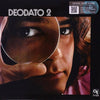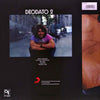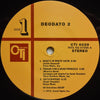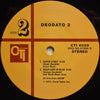







Deodato 2
Rarity - Sealed
Keyboards – Eumir Deodato
Arco Bass – Alvin Brehm, Russell Savakus
Baritone Saxophone – Joe Temperley
Bass – John Giulino, Stanley Clarke
Bass Trombone – Tony Studd
Cello – Alan Shulman, Charles McCracken, George Ricci
Drums – Billy Cobham, Rick Marotta
Flute – George Marge, Hubert Laws, Jerry Dodgion, Romeo Penque
French Horn – Brooks Tillotson, Jim Buffington
Guitar – John Tropea
Percussion, Congas – Gilmore Degap*, Rubens Bassini
Trombone – Garnett Brown, Wayne Andre
Trumpet – Burt Collins, Joe Shepley, Victor Paz
Trumpet, Flugelhorn – Alan Rubin, Jon Faddis, Marvin Stamm
Viola – Alfred Brown, Emanuel Vardi
Violin – David Nadien, Elliot Rosoff, Emanuel Green, Gene Orloff, Harold Kohon, Harry Cykman, Harry Glickman, Harry Lookofsky, Irving Spice, Joe Malin, Max Ellen, Paul Gershman
Conductor Eumir Deodato
Arranged by Eumir Deodato
Written by Justin Hayward (A1), Maurice Ravel (A2), Eumir Deodato (A3, B1), George Gershwin (B2)
1LP, Gatefold jacket
Original analog Master tape : YES
Heavy Press : 180g Virgin Vinyl
Record color : Black
Speed : 33 RPM
Size : 12'’
Stereo
Studio
Record Press : Pallas
Label : Speakers Corner
Original label : CTI Records
Recorded in April 12 & May 16, 1973 at Studio Van Gelder Studio, Englewood Cliffs, NJ
Engineered by Rudy Van Gelder
Produced by Creed Taylor
Mastered by Willem Makkee
Design by Bob Ciano
Photography by Duane Michals, Alen MacWeeney
Originally released in July 1973
Reissued in April 2014
Tracks :
Side A:
1. Nights In White Satin
2. Pavane For A Dead Princess
3. Skyscrapers
Side B:
1. Super Strut
2. Rhapsody in Blue
Reviews :
“Deodato's debut for CTI, Prelude, earned him a genuine reputation for funky fusion with its groove-tight cover of "Thus Spake Zarathustra," the theme from Stanley Kubrick's 2001: A Space Odyssey. The rest of the album isn't quite as memorable, but it fit the bill and got nice reviews for its innovative read of Borodin and Debussy's "Prelude to the Afternoon of a Faun." On 2, the Brazilian composer and arranger dips into the funked-up fusion tank once again, and comes out with a more consistent disc than its predecessor. Arranged, conducted, and keyboarded by Deodato himself instead of CTI house arrangers Don Sebesky or Bob James, the maestro enlisted a fusion who's who of sidemen including drummer Billy Cobham, bassist Stanley Clarke, and flutist Hubert Laws, as well as rockers like John Tropea on guitar. The larger ensemble that provides brass, woodwind, and string support includes trumpeter Jon Faddis and Jim Buffington. "Super Strut" kicks it off. Deep-grooved lines of accented angular riffing and rim-shot syncopation by Cobham turn this simply notated four-stepper into a burning ball of greasy rock and souled-out jazz. This is followed by a wildly campy but nonetheless wondrous read of "Rhapsody in Blue" done Stevie Wonder-style. Deodato's keyboard work never lets the groove drop; he pulls the rhythm section down around him and hunkers his phrasing to punch up the long, sweeping horns and string lines. Less successful is a read of "Nights in White Satin," with its overwrought strings, and a "Pavane for a Dead Princess" that's a snore. The album officially closes with "Skyscrapers," another jazz-rock rave-up that blasts holes in the sonic sky with its dueling keyboard and guitar lines.” AllMusic review by Thom Jurek
In his early years, Deodato, "the gift of God," cultivated a highly original art of give and take in his music. On this album Deodato again rocks and grooves with works from past eras: Gershwin’s "Rhapsody In Blue" is reworked rhythmically and enriched, while Ravel’s "Pavane" unfolds hesitatingly over a velvety carpet of sound. And why not win new fans for major musical works? Deodato, the master, and his complex musical apparatus impart a true Latin feeling to these covered works. The new classic "Nights In White Satin" too, one of the most congenial gigantic hits from the '60s, is staged by Deodato as a miniature slow rock drama just as perfectly as he cultivates his own very pure funky style ("Super Strut"). In Deodato’s arrangements, the powerful instrumental forces open out almost effortlessly and evolve into a gentle flow of sheer pleasure. Everything appears to be simple, although nothing is simple! And therein lies the uniqueness of "the gift of God."
Ratings :
AllMusic : 3.5 / 5 ; Discogs : 4.35 / 5



